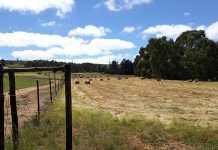Sustainable systems are economic, care for people and protect the environment. Many farmers in South Africa have practised the principles of sustainable farming for years, but in future, increased pressure from society will force farmers to ensure that they not only do the right thing, but are also seen to be doing the right thing. The first requirement for a sustainable farming system is that it must be profitable. Profits are needed to supply wages for the farmer and his employees.
The farm must also generate enough income to enable the farmer to invest in newer, more efficient technology to enable him to further decrease his impact on the environment. Income, of course, consists of cash and non-cash elements. While the non-cash elements, such as the value of a livestock herd, do contribute to profits, a cash income is needed to fund day-to-day expenses.
Government has an important role to play in promoting farm profitability; it must provide the legal and regulatory environment in which farmers can operate. When government fails in its allotted tasks, agricultural profitability suffers. The interminable foot-and-mouth debacle in KwaZulu-Natal is a good example: government did not keep border fences in good repair and thereafter failed to manage the outbreak of the disease.
Confidence
The long-term profitability of agriculture depends on farmers’ confidence in agriculture. Without this, farmers are unwilling to invest in permanent facilities. The current uncertainty about property rights demotivates farmers. Even though these rights are enshrined in the Constitution, government’s actions over the past few years do not fill one with confidence that farmers can be sure of their property rights.
In much of his work, famous Peruvian economist Hernando de Soto Polar emphasises the importance of property rights as the foundation of economic activity. According to him, it is not the lack of resources or skills that results in poor economic growth in developing countries, but the lack of formal property ownership systems backed up by the legal framework to record property ownership.
Ratio of debts to assets
While a farm’s profitability is a prerequisite for sustainability, it is not a guarantee of sustainability. A farm can be highly profitable, but if its debt load is so high that debt repayment eats up all the profits, the farm will not remain sustainable.
The level of debt a specific farm can manage safely depends on the profitability of the farm, as well as the size of the farmer’s own drawings and other items bought and paid for with farming income.
Low returns and high personal expenses are a sure recipe for disaster. The ratio of debt to own assets is a good indicator of financial sustainability. While it is generally accepted that total debt should not be higher than 33% of total assets, this is a very broad guideline and the actual level for individual farmers depends on the specific farm and farmer.
Farmers and farm workers
A good relationship between farmers and farm workers existed for years. Many farmers took responsibility for workers’ housing, health care and the education of their children – without calculating the actual cost of all these services. When the new minimum wage was introduced, farmers started to value all of these in-kind services and in many cases stopped supplying them. This damaged the close relationship between farmers and workers.
This aside, and despite frequent inflammatory statements about farmers’ treatment of their labourers, the truth is that, in most cases, farm workers are better fed and housed than many workers in the cities, especially those who live in squatter camps.
Most farmers genuinely care about their farm workers and do all they can to provide better conditions for them. In other words, to the extent that the profitability of their businesses allows farmers to do so, they attempt to ensure sustainable local social structures.
Biological farming
It makes sense to farm in an environmentally friendly way. This includes biological farming methods, including minimum-tillage, the use of compost and the recycling of manure. Farmers who think and farm biologically, but are still able to adapt to current conditions will indeed develop sustainable farming systems. Combining livestock and crop enterprises, for example, will increase the sustainability of farming systems.
Dr Koos Coetzee is an agricultural economist at the MPO. All opinions expressed are his own and do not reflect MPO policy.



